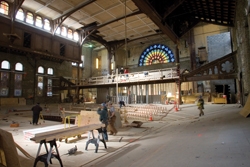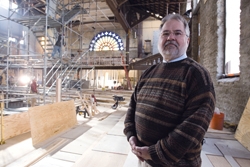Baptist Temple moves into reconstruction phase
Executive director Charles Henry Bethea outlines plans for performances starting in January 2010
The transformation of the Baptist Temple into a historic landmark that’s also a premier arts and events center has taken another important step forward with the completion of a critical phase — removal of the church’s inner structure and stabilization of the building — and the launch of the reconstruction process.
Opened in 1891 at the corners of North Broad and Berks streets, the Baptist Temple was one of the largest Protestant churches in the United States and the dream of Temple University founder and Baptist minister Russell Conwell. It has long been a Philadelphia landmark and serves as a historic cornerstone of Temple’s North Philadelphia campus. Now, 118 year later, Baptist Temple is undergoing a $29 million transformation into an arts and events center.
The center will house two event or performance spaces. One is in the main part of the old temple, essentially the sanctuary. The space, which features a thrust stage and can be configured for about 1200-1500 seats on either three or four sides, will acoustically favor music performance and also be appropriate for other types of events, such as theater and dance.
“Downstairs, the space that used to house the Chapel of the Four Chaplains is largely being restored as it was because it is such a magnificent, small room,” said Charles Henry Bethea, executive director of the Baptist Temple. “The great thing about that space is it will be flexible not just for performance use, but maybe other activities such as social events or activities that are related to performances in another part of the building or on their own.”
The rest of the historic facility is being designed to support these two primary public spaces.
Over the past several months, Bethea has been busy meeting with various campus constituencies who would have a prime interest in using the facility. He has also been developing scheduling and usage policies, planning staffing needs and putting together an operating budget for the facility’s opening, which has been targeted for January 2010.
“We’re formulating use policies now and planning how we can balance the desires and the expectations of all those who view the Baptist Temple as a great destination, with the goal of being ready to begin hosting events and activities next winter.
“Because of the versatile vision that’s being expressed about the Baptist Temple — it really is an events center, not just a performing arts center or university auditorium — it will fill both a role within the campus and also within the community,” he added. “The size of the space, the versatility of the space and its location right on Broad Street really lends itself to continuing to expand our reach into the community as part of the university’s mission.”
Despite the building’s complete makeover inside, Bethea emphasized that it will retain much of its original character. In particular, the stained glass from the original windows is being retained and refurbished. “The major characteristics of the building — the great open space, the walls and the arches and the design features that make it so unique — are being retained.”
Bethea said the possibilities for the Baptist Temple are unlimited, and that the facility is primed to become a northern anchor of Philadelphia’s Avenue of Arts. “I think what people are going to find is that the new Baptist Temple is going to be a fresh and breath-taking new version of an old familiar friend.”
Before joining Temple, Bethea spent 12 years at the University of Nebraska-Lincoln, as executive and artistic director of the Lied Center for Performing Arts. Prior to that, he spent 28 years at Arizona State University where he was involved in overseeing the operations of both athletic and performing arts facilities.

